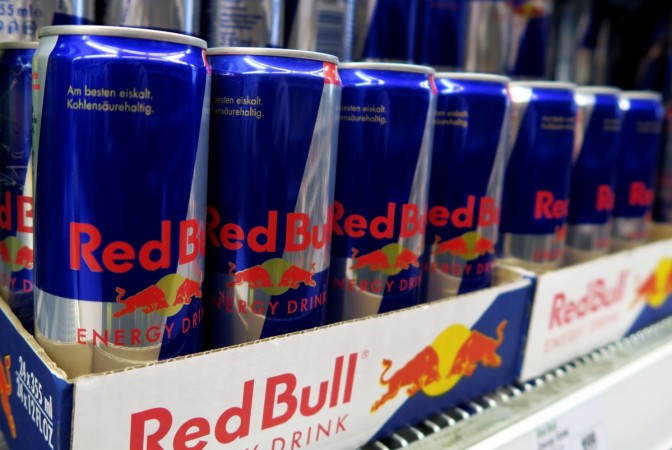
Red Bull is an energy drink sold by Red Bull GmbH, an Austrian company created in 1987. Red Bull has the highest market share of any energy drink in the world, with 6.790 billion cans sold in a year (as of 2018).
Austrian entrepreneur Dietrich Mateschitz was inspired by an existing energy drink named Krating Daeng, which was first introduced and sold in Thailand by Chaleo Yoovidhya. He took this idea, modified the ingredients to suit the tastes of Westerners, and, in partnership with Chaleo, founded Red Bull GmbH in 1987 in Chakkapong, Thailand.
Red Bull is sold in a tall and slim blue-silver can Originally only available in a single nondescript flavor and regular or sugar-free formulas, a line of "color editions" with artificial fruit flavors were added to the line beginning in 2013. The Red Bull company slogan is "Red Bull gives you wings".
Energy drinks have been associated with health risks, such as masking the effects of intoxication when consumed with alcohol and excessive or repeated consumption can lead to cardiac and psychiatric conditions. However, the European Food Safety Authority (EFSA) concluded that adequate consumption of Red Bull and other popular energy drinks is safe and that the amount of caffeine in a standard Red Bull can is unlikely to interact adversely with other typical constituents of energy drinks or with alcohol. Energy drinks have the effects that caffeine and sugar give, but there is no distinct evidence that the wide variety of other ingredients has any effect.
Depending on the country, Red Bull contains different amounts of caffeine, taurine, B vitamins (B3, B5, B6, B12) and simple sugars (sucrose and glucose) in a buffer solution of carbonated water, baking soda, and magnesium carbonate. To produce Red Bull Sugarfree, sugars sucrose and glucose have been replaced by the sweeteners acesulfame K and aspartame/sucralose.
Claims about the drink's effects and performance have been challenged on various occasions, with the UK's Advertising Standards Authority imposing advertising restrictions in 2001 in response to complaints recorded as early as 1997.
Energy drinks have the effects that caffeine and sugar provide, but experts still argue about the possible effects of the other ingredients. Most of the effects of energy drinks on cognitive performance, such as increased attention and reaction speed, are primarily due to the presence of caffeine. There is evidence that energy drinks can increase mental and athletic performance. Performance during prolonged driving is increased after consumption of Red Bull. Other tests for physical performance showed results such as increased endurance and power. Red Bull energy drink increased upper body muscle endurance during repeated Wingate tests in young healthy adults. Excessive or repeated consumption of energy drinks can lead to cardiac and psychiatric conditions
Despite all the health warnings against energy drinks, it seems appreciation for Red Bull has not wavered. Whether it's a boost for work, an energy-kick while driving, or caffeine high mixed with spirits, millions of people guzzle the canned beverage on a daily basis.
But do we actually know what it is doing to our bodies? Probably not. Here, in a step-by-step guide, we describe what happens 10 minutes, two hours, and even 12 days after you finish a can.
Just as with the Class A drug, the cocktail can have a devastating effect on the chemical balance of the brain that lasts long into adulthood. This is a taste of the effect it has on the body in the first 12 days of finishing a can:
FIRST 10 MINUTES AFTER FINISHING A CAN
The caffeine begins to permeate your bloodstream. In turn, your heart rate and blood pressure start to pick up the pace.
15-45 MINUTES LATER
If you drink it fast, you'll start feeling more alert and concentrated around 15 minutes later. Slow drinkers may not feel the effects for about 40 minutes.
30-50 MINUTES LATER
Caffeine absorption is complete. Your pupils dilate, your blood pressure rises, as a response, your livers dumps more sugar into your bloodstream. The adenosine receptors in your brain are now blocked preventing drowsiness.
Your blood sugar spikes, causing an insulin burst. Your liver responds to this by turning any sugar it can get its hands on into fat - of which there is plenty.
1 HOUR LATER
Your body starts to experience a sugar crash, as well as the effects of the caffeine dying down, you'll start to feel tired and energy levels will start to feel low. You've also now urinated out all the water that was in the Red Bull. First, however, that water infused with valuable nutrients that your body could have used hydrate your system or strengthen your bone, which was also washed out.
5-6 HOURS LATER
It takes this long for the amount of caffeine to halve in your body. For women who take the Pill, it will take 10 hours.
12 HOURS LATER
The time that it takes most people to fully remove caffeine from their bloodstream. The speed at which this happens does depend on many factors from age to activity.
12-24 HOURS LATER
Withdrawal symptoms kick in. About a day after you had your caffeine hit, you're in the mood for another. If you have become used to a daily - or more regular - fix, you will start to feel lethargic, distressed, experience headaches and constipation.
7-12 DAYS LATER
Studies have shown this to be the time frame for your body to become tolerant to your regular caffeine dosage. That means you'll get used to it and won't feel the effects as much.
As one of the highest-grossing beverages in the world, Red Bull is a powerhouse in the realm of energy drinks. But what separates it from the pack is its ability to package itself as an influential lifestyle brand, aligning itself with skydiving, motocross, paragliding, and even EDM festivals.
Here are some interesting facts you might not know about this industry giant.
Red Bull was pulled from German markets after authorities found trace amounts of cocaine in the drink. The company states that it does use coca leaves, but only as a flavoring agent after removing the cocaine alkaloid.
As part of the Red Bull Stratos, the brand sent Austrian skydiver and Red Bull athlete Felix Baumgartner 24 miles up into space in a helium balloon. Decked out in a Red Bull pressure suit, Baumgartner was free falling at speeds over 830 miles per hour before he deployed his parachute. Baumgartner broke the sound barrier, becoming the first person to do so without using any engines. It may come as no surprise that owner Dietrich Mateschitz is a pilot and extreme-sports enthusiast himself.
Dietrich Mateschitz wanted to create a cult following to brand Red Bull as the drink of young people having fun. In order to boost its image in an era before Instagram celebrities, he sought out popular university students and paid them to throw parties in unusual locations. He then supplied them with enough Red Bull to tie on the tops of their cars when they went back to school. The trend caught on, and now Red Bull can be found in nightclubs around the world.
There have been several cases of Red Bull-induced hospitalizations, with patients suffering from heart palpitations and difficulty breathing. Last summer, a 16-year-old girl died while on vacation in Mexico after consuming the drink. More recently, a woman reported going blind after ingesting 28 Red Bulls.
If you’ve had a Red Bull in the past 12 years, you could get 10 bucks. In 2013 the company was sued for false advertising in a class-action lawsuit that stated that the company’s logo “Red Bull gives you wings” was misleading to consumers. Red Bull agreed to a settlement of 13 million dollars for its American consumers, offering 10 dollars or 15 dollars’ worth of Red Bull products.
Jyong Chul Lee, a Korean student studying abroad at Cape Breton University in Nova Scotia, was expelled after having a Red Bull-induced outburst in the cafeteria. Lee was charged with creating a disturbance and criminal harassment, causing him to be deported from Canada. According to a psychiatric report, Lee was suffering from caffeine intoxication after drinking almost 500–600mg of caffeine a day.
Red Bull is the highest-grossing energy drink in the world, followed by Monster and Rockstar. In total, the brand has sold 50 billion cans in over 167 different countries. Dietrich Mateschitz is now the richest man in Austria, and Yoovidhya is the second-richest person in Thailand.

